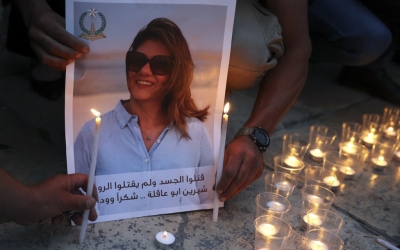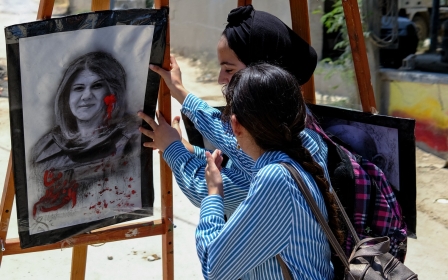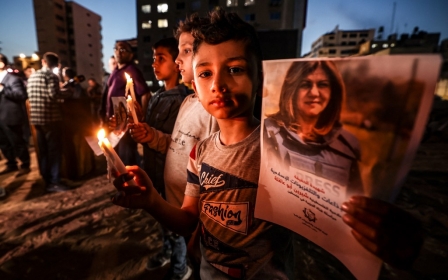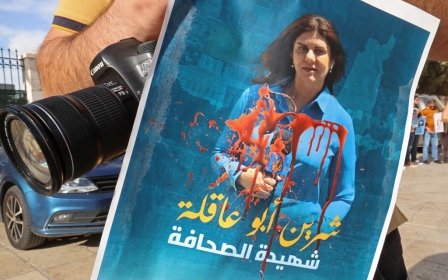Shireen Abu Akleh: A year later, justice is nowhere in sight
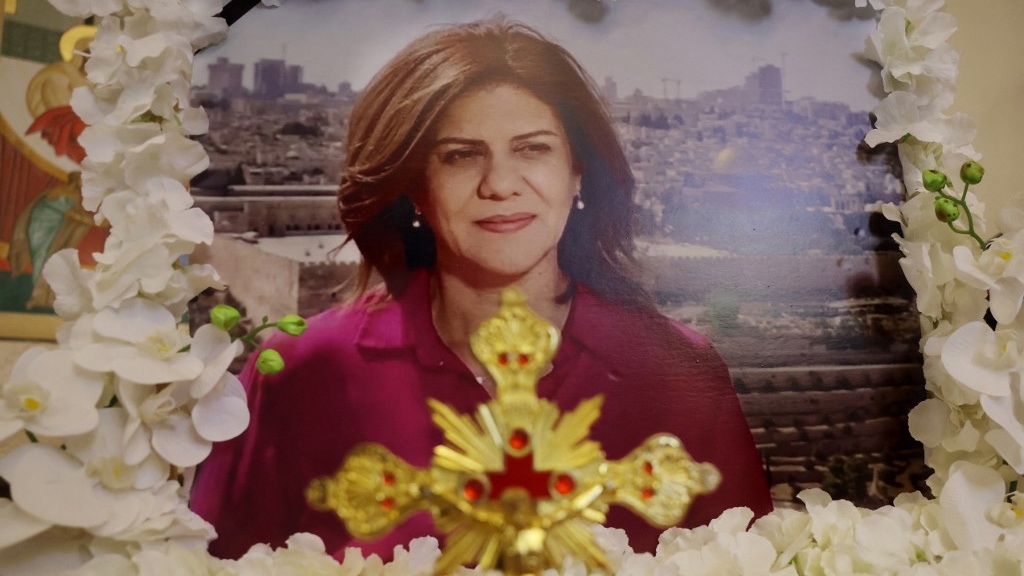
Shireen Abu Akleh was killed one year ago, but justice continues to elude her and countless other Palestinians.
When reporting on injustices, Abu Akleh spoke with passion and empathy, but always maintained professional balance. When viewing current coverage of demonstrations and protests, I still half expect to see her there, looking into the camera, speaking in her usual calm, authoritative voice.
In her last report, which commemorated the anniversary of the Palestinian Nakba and was filmed just two days before she was killed, Abu Akleh visited Al Ruwwayyes village in the occupied West Bank to speak with surviving residents whose families were expelled 74 years earlier.
The report showed Abu Akleh at her best, telling people’s stories and empathising with their pain. She related to people, and they related to her in return.
Abu Akleh’s family and friends are devastated, and our suffering and pain has been made worse by the Israeli army’s lies and deceits, along with its repeated contempt for transparency, accountability and basic human decency.
Multiple investigations, including by CNN and Al Haq’s Forensic Architecture Investigation Unit, have concluded that Abu Akleh was deliberately killed. Yet, an internal Israeli investigation said she was likely shot by mistake, despite her clothing clearly identifying her as a journalist. In refusing to engage with extensive eyewitness testimonies and video footage, Israel continues to deny any wrongdoing.
This deflection of blame and lack of accountability is not unique to Abu Akleh’s case. In September 2000, at the start of the Second Intifada, Muhammad al-Durrah, a 12-year-old boy, was shot dead by Israeli forces as he hid behind his father.
The Israeli army initially conceded that it had killed him by mistake but later retracted that admission, and in May 2013, a government-commissioned report went so far as to allege the boy’s death might have been staged.
Repressive measures
As in Abu Akleh’s case, investigators did not speak to eyewitnesses, and mainly relied on military sources, including video analysis and medical reports.
Talal Abu Rahma, a Palestinian cameraman from the Gaza Strip, shot the footage of Durrah that was aired by France 2 and shocked the world. The Israeli government subsequently dismissed the report as a “justification for terrorism, antisemitism, and the delegitimisation of Israel”.
In another incident, after Israel attacked Jenin refugee camp in April 2002, director Mohammad Bakri produced the film Jenin, Jenin based on interviews and Palestinian testimonies - only to be sued in 2016 by an Israeli reservist for defamation. An Israeli court subsequently banned screenings of the film, and Bakri was ordered to pay around $50,000 in damages and $15,000 in legal expenses.
After the ruling, Abu Akleh herself interviewed Bakri, shedding light on Israel’s repressive measures to silence the Palestinian narrative.
Others killed by the Israeli state and its settler appendage include 26-year-old Mohammad Khaled al-Osaibi, a doctor recently shot at an entrance to Al-Aqsa Mosque complex by what an Israeli court described as an act of “lawful self-defence”; and Mohammed Abu Khdeir, a 16-year-old who was kidnapped by settlers in 2014, before being tortured and burned to death. Three settlers were convicted and given lengthy prison sentences.
Many other Israeli representatives have sought to deny the existence of Palestinians
Yet, when Abu Khdeir’s family called for the perpetrators’ homes to be demolished - which is done regularly to Palestinian homes as a punitive measure - the court refused, saying Jewish terrorists were “a minority of a minority of a minority”. This inaccurate and self-serving deception aimed to diminish the reality of settler violence across occupied Palestine.
In fact, settler violence has heightened since Israelis last year elected a far-right extremist government, including Religious Zionist leader Bezalel Smotrich, who has publicly advocated a shoot-to-kill policy, and Jewish Power leader Itamar Ben Gvir, who was convicted in 2007 of inciting racism and supporting the Kach terrorist organisation. Both are now responsible for upholding the highest matters of state.
Zionist ideology
Such extremist views are an outgrowth of the colonial Zionist ideology in Israel that has been sustained by external powers since its inception. Here, it is instructive to recall that the 1917 Balfour Declaration committed to establishing a Jewish “national home” in Palestine, without consulting Palestinians or even acknowledging their very existence.
Since then, Palestinian resistance to Zionist activities has been met with a lack of impartiality and tremendous efforts to undermine Palestinian demands. Such colonial policies led to the Nakba, which continues to this day.
This past February, while Palestinian officials participated in the Aqaba summit in Jordan, under US pressure and with a promise of a diplomatic push for renewed political negotiations, Israeli settlers attacked the village of Huwwara, torching houses and cars under the protection of Israeli soldiers. Local and international observers drew direct comparisons with the Nakba.
The Huwwara escalation can only be understood by referring to the Zionist ideology that legitimises the dispossession and removal of Palestinians. After the attack, Smotrich said that Huwwara must be “wiped out”. This echoed the 1992 comments of former Israeli Prime Minister Yitzhak Rabin, who openly wished that Gaza would “sink into the sea”.
Many other Israeli representatives have sought to deny the existence of Palestinians and/or to retrospectively justify their expulsion. Such representations have seeped into the wider international consciousness and are now reproduced, whether knowingly or unknowingly, by international officials - see European Commission President Ursula von der Leyen’s recent comments about Israel making “the desert bloom”.
In seeking to understand and comprehend the unjustified killing of Abu Akleh and countless other Palestinians, we are obliged to refer to the Zionist ideology, and more specifically its various justifications for incarceration, control, and ultimately, state-sanctioned murder.
Palestinian rights can only be realised if Israel is pressured to comply with international law
Abu Akleh’s family and friends continue to seek to hold Israel accountable for her death, but this is not the same as seeking justice. It is an illusion to expect justice from the coloniser. We do not engage with Israel’s lies and deceits in the belief that it will bring justice; we do so in hopes of forcing the state to acknowledge that its militaristic and dehumanising ideology is directly responsible for the deaths of countless Palestinians.
Sadly, I do not expect any progress in the case of Abu Akleh or any other Palestinian victims of Israeli aggression, as long as the international community continues to ignore the Palestinian narrative and turn a blind eye to daily human rights violations.
Palestinian rights can only be realised if Israel is pressured to comply with international law - but if the billions of dollars in military aid and staunch political support it receives from the US continue unabated, there will be little incentive for Israel to change its ways.
The views expressed in this article belong to the author and do not necessarily reflect the editorial policy of Middle East Eye.
Middle East Eye propose une couverture et une analyse indépendantes et incomparables du Moyen-Orient, de l’Afrique du Nord et d’autres régions du monde. Pour en savoir plus sur la reprise de ce contenu et les frais qui s’appliquent, veuillez remplir ce formulaire [en anglais]. Pour en savoir plus sur MEE, cliquez ici [en anglais].



